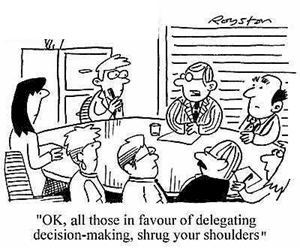 Committee Members ask few questions, make fewer comments, decide to pass the buck back to the City Council.
Committee Members ask few questions, make fewer comments, decide to pass the buck back to the City Council.
Thursday afternoon, the San Leandro City Council’s Rules and Communication Committee met to discuss the staff (read city attorney’s) proposal (read intense push) to amend the Zoning Code to ban entertainment and recreational use in industrial areas of San Leandro. As one of the City’s attorneys made clear last week, the reason for the ban is to help on the lawsuit against Faith Fellowship.
Every single non-staff speaker at the meeting: community members, the Chamber, business owners and yours truly spoke against the ban. Twenty first century companies, specially high tech ones, realize the importance of combining work with relaxation, and appreciate nearby recreational facilities which allow their employees to let off steam, and them come back to work. An entertainment/recreational ban will discourage those companies from moving into town.
The Planning Commission has voted twice against the ban. The Board of Zoning Adjustments expressed its disapproval. Plenty of people have spoken against it, and the city has not heard ONE community member speak or send an e-mail in favor of this (I checked). And still, there seems to be a strong will to give away the future of the city for the potential legal advantage (one that I don’t quite get) in a lawsuit we are going to lose anyway.
Among the speakers at the meeting was Pastor Gary Mortara of the Faith Fellowship Church. He said that as a community member he doesn’t want to hurt the city, his interest is in getting a property for them to build a church (I’ve been suggesting that we give him the former Albertson’s property, this would put 1700 people downtown every Sunday, as well as many during the week). He asked that the City not hurt the community for what’s a matter between them.
For me, giving away the future of this city for whatever legal advantage we may get in one case is just bad public policy.
The rules committee did not recommend against the code change, however. Mayor Cassidy seems to prefer to add assembly use to the area rather than ban entertainment and recreation, but wants more time.
Council member Jim Prola is stuck on the 70’s and wants to preserve manufacturing. He also wants to attract high tech companies, but even though he has no experience working for one, he believes he knows all about them and won’t listen to what people with experience have to say. Prola is a great guy, but he’s very reluctant to go against staff on anything that is not labor-related.
As for Ursula Reed, I’m not clear where she stands. I think she was very much in favor of doing what the City Attorney told her (she’s not an independent thinker, and usually just rubber stamps what comes from staff), but she’s starting to realize how detrimental that would be to San Leandro. She is also running for re-election this November, possible against Chris Crow (who has been very vocal on his opposition to this ban), and she may not want to antagonize voters on yet another issue. She’s already made enemies by pushing the purchase of i-pads for City Council members and top staff and by voting for red light cameras, even though they will cost the City money in the long (and probably short) run. That said, Reed is not the most politically savvy person out there.
As for the rest of the Council, Diana Souza indicated last week she’d vote for the ban, which I’d expect from her. Souza came to the Council with only two issues in mind: building a lap pool in Washington Manor and getting rid of the Links shuttle. She was unsuccessful on both counts, and has since taken a very anti-community attitude. She’s termed out and has no prospects for a political career, so she has no accountability whatsoever.
Joyce Starosciak will probably vote for the ban as well – or at least abstain. She also kisses the staff’s butts whenever possible, though she should be wary of this decision if she actually plans to run for office again (and she has a committee for a City Council run in 2016). Pauline Cutter also has a tendency to rubber stamp and she often has great difficulty understanding issues she’s unfamiliar with – for some weird reason her concerns about the zoning change had to do with parking (?!). Finally, Michael Gregory is hard to predict, though he never goes out on a limb, so I’d say he’ll vote for the ban as well – unless the Council seems to be moving against it. He doesn’t like to make waves.
The one thing that really bothers me is that none of them (save for Cassidy who is, after all, a lawyer) seem to be able to grasp the actual issues at play. I know it’s not just my inability to explain them – there have been many speakers, using different languages and arguments to do so. I think it’s just their lack of experience outside their personal spheres, their laziness vis a vis researching matters on their own or thinking about them, and their unwillingness to stand for something.
As next election cycle comes around, I can only hope that a couple of competent, intelligent candidates run.

 It’s an Acknowledgement that they Violated Faith Fellowship’s Constitutional Rights but… is it good Public Policy?
It’s an Acknowledgement that they Violated Faith Fellowship’s Constitutional Rights but… is it good Public Policy?